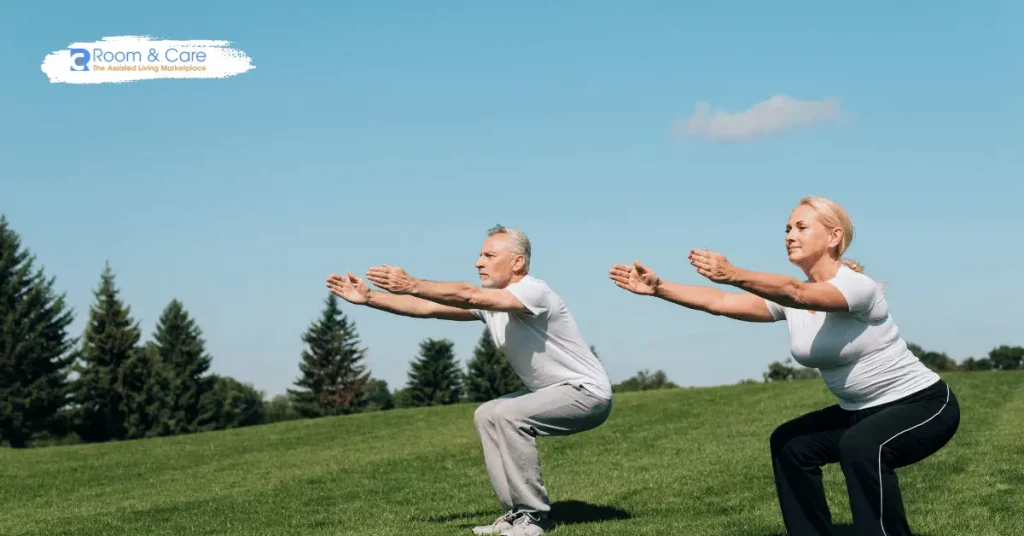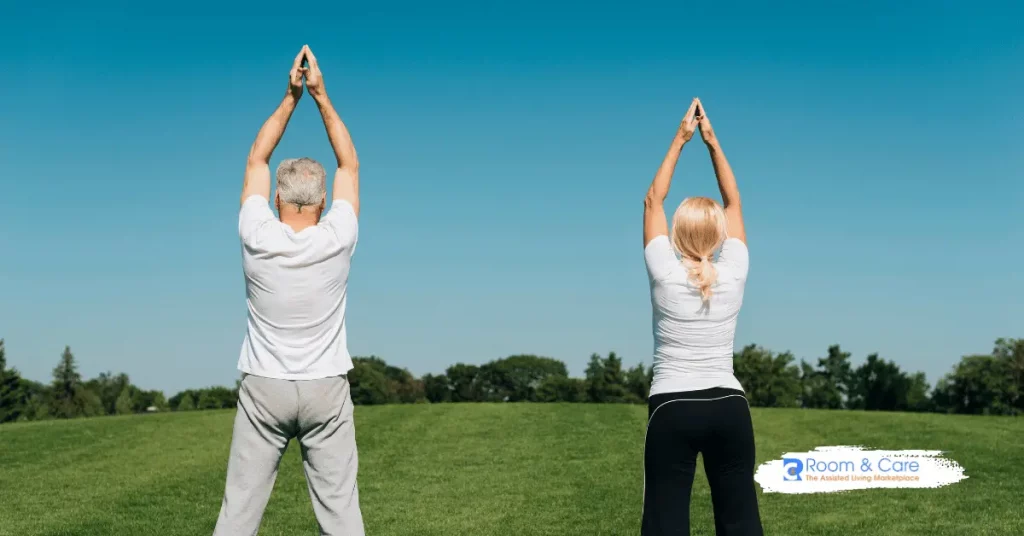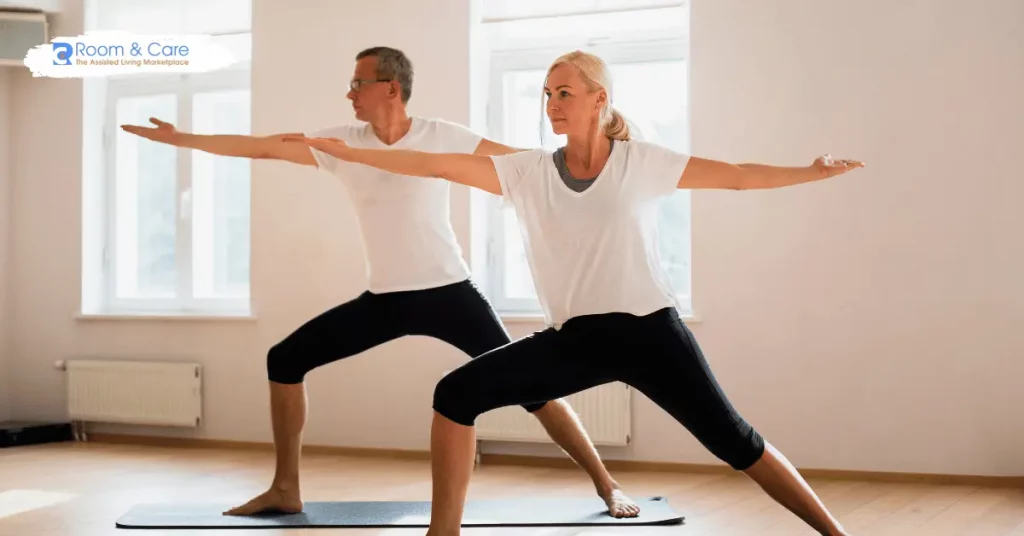

Staying active and maintaining our well-being becomes even more important as we age. Tai Chi for old people has emerged as a popular and effective way for seniors to stay healthy. This ancient Chinese martial art combines slow, deliberate movements with mindfulness, offering numerous physical and mental benefits. In this article, we’ll explore the benefits of Tai Chi for seniors, why it’s especially suited for assisted living, and how to get started. Tai Chi could be the key to a healthier, happier life in your later years.
Tai Chi, often referred to as “meditation in motion,” is a form of exercise that originated in ancient China. It combines slow, flowing movements with deep breathing and mindfulness. The practice is rooted in the Chinese philosophy of balancing opposing forces (Yin and Yang) to achieve harmony in the body and mind. Unlike other martial arts, Tai Chi is not focused on combat; instead, it promotes relaxation, balance, flexibility, and inner calm.
Tai Chi is particularly well-suited for seniors because it is a low-impact exercise that places minimal stress on the joints. It can be adapted to accommodate various fitness levels, making it accessible to almost everyone. The slow, graceful movements of Tai Chi allow seniors to stay active while reducing the risk of injury.
Whether practiced standing or seated, Tai Chi helps improve balance, flexibility, and coordination. Many older adults find it to be an enjoyable way to stay physically active while also enhancing mental clarity and emotional well-being.
Tai Chi for older adults isn’t just about physical fitness; it offers a holistic approach that supports the mind, body, and spirit. Let’s explore the main benefits that make Tai Chi an excellent practice for seniors.
One of the most significant benefits of Tai Chi is its ability to improve balance and coordination. As we age, balance tends to decline, increasing the risk of falls—a leading cause of injury among seniors. Studies have shown that regular Tai Chi practice can significantly reduce the risk of falls in older adults. In fact, a study published in the Journal of the American Geriatrics Society found that Tai Chi practice can reduce fall risk by up to 58%.
Tai Chi strengthens the muscles around the hips, knees, and ankles, which helps improve stability and coordination. This is particularly beneficial for seniors living in assisted living facilities, where fall prevention is a major focus. Assisted living homes that offer Tai Chi can help their residents improve their balance, leading to greater confidence and independence.
For older adults suffering from arthritis or joint pain, Tai Chi offers a gentle way to stay active without causing strain. Tai Chi promotes the flow of synovial fluid, which lubricates joints and keeps them healthy. The slow, controlled movements of Tai Chi help improve flexibility and range of motion without putting stress on the joints.
The Arthritis Foundation recommends Tai Chi for managing arthritis symptoms because it can help reduce pain, improve joint function, and increase mobility. Unlike high-impact exercises, Tai Chi allows seniors to stay active in a way that is both safe and effective.
Mental health is just as important as physical health, especially in later life. Tai Chi promotes relaxation by combining deep breathing with mindful movement, helping to reduce stress and anxiety. Seniors who practice Tai Chi often report feeling calmer and more centered after their sessions.
This is especially helpful for those living in assisted living facilities, where adjusting to a new environment can be stressful. Regular Tai Chi practice can help alleviate anxiety and promote emotional well-being, making the transition to assisted living smoother for residents.
While Tai Chi may appear slow and gentle, it still provides a mild cardiovascular workout. Regular practice of Tai Chi can improve circulation, lower blood pressure, and enhance overall heart health. These benefits are particularly important for older adults who are more susceptible to heart conditions and hypertension.
A study published in the British Journal of Sports Medicine found that Tai Chi was associated with reductions in both systolic and diastolic blood pressure, as well as improvements in cholesterol levels. This makes Tai Chi an excellent choice for seniors looking to maintain their cardiovascular health without engaging in strenuous exercise.

Tai Chi is not only beneficial for physical health but also for mental well-being. The practice requires focus, coordination, and memory, which can help enhance cognitive function in older adults.
This makes Tai Chi an excellent option for individuals with mild cognitive impairment or early-stage dementia. By engaging both the body and the mind, Tai Chi helps stimulate neural activity and improve brain function, making it a valuable tool for maintaining cognitive health.
Tai Chi is often practiced in groups, making it a great way for seniors to socialize and build connections with others. Social interaction is critical for maintaining mental and emotional health, particularly for older adults who may feel isolated or lonely. Participating in group Tai Chi classes can help foster a sense of community and belonging.
In assisted living homes, regular Tai Chi classes offer residents the opportunity to engage with their peers, share experiences, and enjoy the benefits of group exercise. This sense of camaraderie can have a positive impact on emotional well-being and overall quality of life.
Many assisted living facilities have recognized the value of Tai Chi and have incorporated it into their activity programs. Assisted living homes are designed to provide seniors with a supportive environment where they can enjoy a variety of activities that promote health and well-being. Tai Chi fits perfectly into this model, offering a low-impact, effective exercise that can be enjoyed by residents of all fitness levels.
At Room & Care, we prioritize finding assisted living facilities that offer comprehensive wellness programs, including Tai Chi. Our no-referral-fee model ensures that families can access the best care options without hidden costs. Choosing an assisted living home that includes Tai Chi in its programming can help seniors stay active and engaged, both physically and mentally.
When evaluating assisted living homes that offer Tai Chi, here are some key factors to consider:
By choosing an assisted living facility that incorporates Tai Chi into its wellness programs, you can ensure that your loved one will have access to an effective form of exercise that promotes both physical and mental health.
For those interested in starting a Tai Chi practice, it’s important to approach the exercise with mindfulness and patience. Here are some tips for getting started:
Before beginning any new exercise regimen, especially for seniors with pre-existing health conditions, it’s essential to consult with a healthcare provider. This ensures that Tai Chi is safe and appropriate for your fitness level and health needs.
Tai Chi is a practice of mindfulness and deliberate movement, so there’s no need to rush. Beginners should start slowly, learning the basic movements and focusing on proper form. It’s best to take a class with a certified instructor who can provide guidance and ensure that the movements are performed correctly.
For seniors new to Tai Chi, many instructors offer introductory classes that focus on foundational movements and principles. These classes are designed to be accessible and adaptable, making them ideal for older adults of varying fitness levels.
Consistency is key when it comes to Tai Chi. Even practicing for just 10-15 minutes a day can yield significant benefits over time. For seniors in assisted living, participating in regular classes can help establish a routine and enhance both physical and mental well-being.
For seniors living in assisted living facilities, joining a Tai Chi group can provide motivation and foster a sense of community. Practicing with others offers social engagement, which is important for emotional health in later life.
Group Tai Chi classes are a fun and engaging way for seniors to connect with their peers. By practicing together, residents can build friendships, support one another, and share in the joy of movement and mindfulness.

Yes, Tai Chi is generally safe for seniors, even those with mobility issues. The movements are slow and low-impact, and they can be easily modified to accommodate different abilities. Many Tai Chi classes are offered in a seated format for individuals with significant mobility challenges. Seated Tai Chi still offers many of the same benefits, including improved flexibility, circulation, and mental clarity.
Most experts recommend practicing Tai Chi at least 2-3 times per week. Regular practice helps reinforce the movements and their benefits, such as improved balance, strength, and mental clarity.
Seniors should wear comfortable, loose-fitting clothing that allows for a full range of motion. Flat, flexible shoes are ideal for maintaining stability during practice. If practicing Tai Chi indoors, lightweight, breathable clothing is best.
Tai Chi offers a multitude of benefits for seniors, from improving balance and flexibility to reducing stress and enhancing cognitive function. Whether practiced independently or as part of a group in an assisted living setting, Tai Chi is a powerful tool for maintaining health in later life.
If you’re considering assisted living for yourself or a loved one, look for facilities that offer Tai Chi as part of their wellness programs. At Room & Care, we make it easy to find homes that prioritize holistic well-being, without any referral fees or added costs. Explore our services today to find the best-assisted living options, nursing homes, memory care and adult family homes that support your health and happiness.